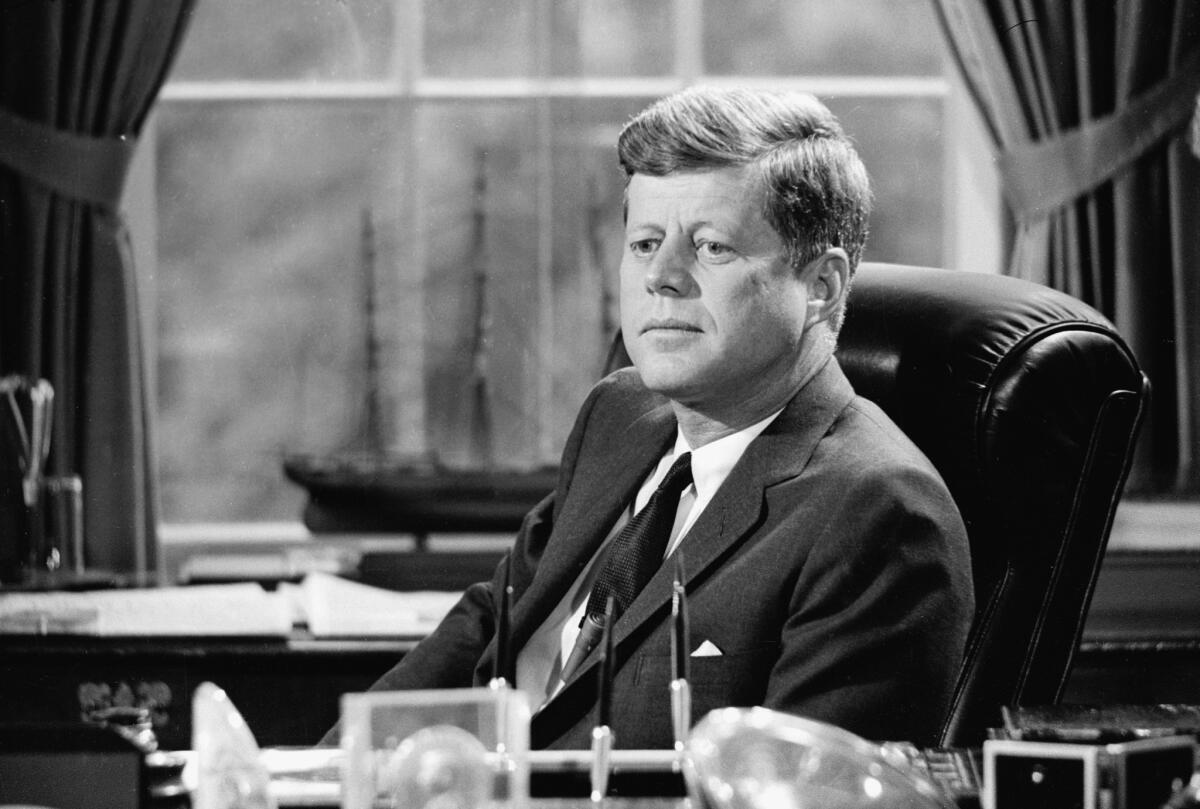Why JFK still matters

- Share via
This week even Americans who weren’t alive on Nov. 22, 1963, are reading, writing and reflecting about the assassination of the 35th president 50 years ago. In the view of some critics, the fascination with both John F. Kennedy and his assassination is disproportionate and media-driven. We disagree. Despite political and personal weaknesses that were widely acknowledged within a few years of his death, Kennedy was a transformative figure, not just a charismatic celebrity. And his violent death rightly is remembered as a rupture in what had seemed an age of optimism and inexorable progress.
True, much of the adulation for Kennedy during his life and since originated in arguably superficial attributes: his youth, personal attractiveness and sophistication. But his election at age 43 to succeed the 70-year-old Dwight D. Eisenhower represented a generational shift in American leadership that was as much a source of popular excitement as Kennedy’s individual qualities. As he said in his inaugural address, “the torch has been passed to a new generation of Americans — born in this century, tempered by war, disciplined by a hard and bitter peace.” Kennedy’s Roman Catholicism also made his election historic. Difficult as it may be for younger Americans to conceive, anti-Catholicism was endemic in American society half a century ago, and Kennedy’s election was nearly as dramatic a breakthrough in that era as the election of the first African American president was in this one.
Kennedy was also forward-looking in his policies. On June 11, 1963, the day on which National Guardsmen escorted two black students as they enrolled at the University of Alabama, Kennedy declared that equality for African Americans was a “moral issue. It is as old as the Scriptures and is as clear as the American Constitution.” He announced that he was asking Congress to enact legislation to ensure equal access to public accommodations. It is true that the Civil Rights Act became law not during Kennedy’s term but during the administration of his less charismatic (but more politically adroit) successor, Lyndon B. Johnson. But Kennedy’s acknowledgment of the urgency of racial equality allowed supporters of the law to portray it as an homage to his memory.
Was Kennedy a great president? Probably not. He wasn’t even a good one, according to the JFK revisionists who constitute at least as much of an industry as those who mythologize “Camelot.” Yes, they concede, Kennedy deftly defused the Cuban missile crisis with a combination of public resolve and a private openness to compromise — but perhaps the Soviet Union wouldn’t have installed missiles in Cuba in the first place if Kennedy hadn’t approved the disastrous Bay of Pigs invasion. It’s a reasonable point.
We also now know that the telegenic husband and father of young children was serially unfaithful to his wife. Yet despite scores of biographies and endless tell-alls, the revisionists never have been able to dispel the Kennedy mystique.
Any assassination of a president is wrenching for the nation, and some of the admiration of JFK is refracted through the trauma of Nov. 22, 1963. But there was a special poignancy to JFK’s passing because of his youth, his optimism and his ability to inspire. It’s neither surprising nor lamentable that he remains a compelling and beloved figure half a century later.
More to Read
A cure for the common opinion
Get thought-provoking perspectives with our weekly newsletter.
You may occasionally receive promotional content from the Los Angeles Times.










